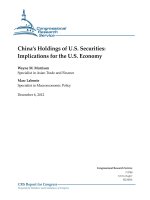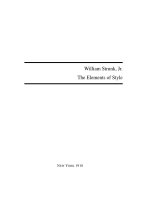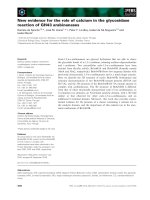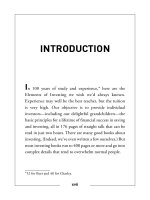New Imperatives for the Elements of Investing_2 pptx
Bạn đang xem bản rút gọn của tài liệu. Xem và tải ngay bản đầy đủ của tài liệu tại đây (297.88 KB, 18 trang )
31
Index
wouldn ’ t know this when Wall Street throws everything
but the kitchen sink at you to convince you otherwise.
This is the plan we use ourselves for our retirement funds,
and this is the plan we urge you to follow too.
NOBODY KNOWS MORE THAN THE MARKET
It is diffi cult for most investors to believe that the stock
market is actually smarter or better informed than they
are. Most fi nancial professionals still do not accept the
premise — perhaps because they earn lucrative fees and
believe they can pick and choose the best stocks and beat
the market. (As the author Upton Sinclair observed a
century ago, “ It is diffi cult to get a man to understand
something when his salary depends upon his not under-
standing it. ” ) The cold truth is that our fi nancial markets,
while prone to occasional excesses of either optimism
or pessimism, are actually smarter than almost all indi-
viduals. Almost no investor consistently outperforms the
market either by predicting its movements or by selecting
particular stocks.
Why is it that you can ’ t hear some favorable piece of
news on the radio or TV or read it on the Internet and
use that information to make a favorable trade? Because
c02.indd 31c02.indd 31 10/31/09 1:35:12 PM10/31/09 1:35:12 PM
32
The Elements of Investing
*Jason Zweig, Your Money and Your Brain (New York: Simon &
Schuster, 2007).
an army of profi t - seeking, full - time professionals will
have likely already pounced on the news to drive the
stock price up before you have a chance to act. That ’ s
why the most important pieces of news (such as takeover
offers) are announced when the market is closed. By the
time trading opens the next day, prices already refl ect
the offer. You can be sure that whatever news you hear
has already been refl ected in stock prices. Something that
everyone knows is not worth knowing. Jason Zweig, the
personal fi nancial columnist for the Wall Street Journal,
describes the situation as follows:
I ’ m often accused of “ disempowering ” people
because I refuse to give any credence to anyone ’ s
hope of beating the market. The knowledge that
I don ’ t need to know anything is an incredibly
profound form of knowledge. Personally, I think
it ’ s the ultimate form of empowerment . . . . If
you can plug your ears to every attempt (by any-
one) to predict what the markets will do, you
will outperform nearly every other investor alive
over the long run. Only the mantra of “ I don ’ t
know, and I don ’ t care ” will get you there. *
c02.indd 32c02.indd 32 10/31/09 1:35:12 PM10/31/09 1:35:12 PM
33
Index
This doesn ’ t mean that the overall market is always
correctly priced. Stock markets often make major mis-
takes, and market prices tend to be far more volatile
than the underlying conditions warrant. Internet and
technology stocks got bid up to outlandish prices in
early 2000, and some tech stocks subsequently declined
by 90 percent or more. Housing prices advanced to
bubble levels during the early 2000s. When the bubble
popped in 2008 and 2009, it not only brought house
prices down, it also destroyed the stocks of banks and
other fi nancial institutions around the world.
Nobody knows more than the market.
But don ’ t for a minute think that professional fi nan-
cial advice would have saved you from the fi nancial tsu-
nami. Professionally managed funds also loaded up with
Internet and bank stocks — even at the height of their
respective bubbles — because that ’ s where the action was
and managers wanted to “ participate ” (and not get left
out). And professionally managed funds tend to have
their lowest cash positions at market tops and highest
cash positions at market bottoms. Only after the fact do
we all have 20 – 20 vision that the past mispricing was
c02.indd 33c02.indd 33 10/31/09 1:35:12 PM10/31/09 1:35:12 PM
34
The Elements of Investing
“ obvious. ” As the legendary investor Bernard Baruch
once noted, “ Only liars manage always to be out of the
market during bad times and in during good times. ”
Rex Sinquefi eld of Dimensional Fund Advisors puts
it in a particularly brutal way: “ There are three classes
of people who do not believe that markets work: the
Cubans, the North Koreans, and active managers. ”
THE INDEX FUND SOLUTION
We have believed for many years that investors will be
much better off bowing to the wisdom of the market and
investing in low - cost, broad - based index funds, which
simply buy and hold all the stocks in the market as a whole.
As more and more evidence accumulates, we have become
more convinced than ever of the effectiveness of index
funds. Over 10 - year periods, broad stock market index funds
have regularly outperformed two - thirds or more of the
actively managed mutual funds.
And the amount by which index funds trounce the typi-
cal mutual fund manager is staggeringly large. The follow-
ing table compares the performance of active managers of
broadly diversifi ed mutual funds with the Standard & Poor ’ s
(S & P) 500 stock index of the largest corporations in the
c02.indd 34c02.indd 34 10/31/09 1:35:12 PM10/31/09 1:35:12 PM
35
Index
United States. Each decade about two - thirds of the active
managers must hang their heads in shame for being beaten
by the popular stock market index.
Percentage of Actively Managed Mutual Funds
Outperformed by the S & P 500 Index
(Periods through December 31, 2008)
1 Year 3 Years 5 Years 10 Years 20 Years
61% 64% 62% 64% 68%
Sources: Lipper and The Vanguard Group.
The superiority of indexing as an investment strategy
is further demonstrated by comparing the percentage
returns earned by the typical actively managed mutual
fund with a mutual fund that simply invests in all
500 stocks included in the S & P 500 stock index. The
table on the following page shows that the index fund
beats the average active fund by almost a full percentage
point per year, year after year. *
*
We show these comparisons versus the S&P 500 index because “total
stock market” funds (the ones we recommend) have only recently
come into existence.
c02.indd 35c02.indd 35 10/31/09 1:35:12 PM10/31/09 1:35:12 PM
36
The Elements of Investing
Average Annual Returns of Actively Managed
Mutual Funds Compared with S & P 500
(20 years, Ending December 31, 2008)
S & P 500 Index Fund 8.43%
Average Active Equity Mutual Fund
a
7.50%
Shortfall
ϩ0.93%
a
Consists of all Lipper equity mutual fund categories.
Sources: Lipper, Wilshire, and The Vanguard Group.
Why does this happen? Are the highly paid professional
managers incompetent? No, they certainly are not.
Here ’ s why investors as a total group cannot earn more
than the market return. All the stocks that are outstand-
ing need to be held by someone. Professional investors
as a whole are responsible for about 90 percent of all
stock market trading. While the ultimate holders may be
individuals through their pension plans, 401(k) plans, or
IRAs, professional managers, as a group, cannot beat the
market because they are the market.
Because the players in the market must, on average,
earn the market return and winners ’ winnings will equal
losers ’ losses, investing is called a zero - sum game. If some
investors are fortunate enough to own only the stocks
c02.indd 36c02.indd 36 10/31/09 1:35:13 PM10/31/09 1:35:13 PM
37
Index
that have done better than the overall market, then it
must follow that some other investors must be holding
the stocks that have done worse. We can ’ t and don ’ t
live in Garrison Keillor ’ s mythical Lake Wobegon, where
everybody is above average.
But why do professionals as a group do worse than the
market? In fact, they do earn the market return — before
expenses. The average actively managed mutual fund
charges about one percentage point of assets each year
for managing the portfolio. It is the expenses charged by
professional “ active ” managers that drag their return well
below that of the market as a whole.
Low - cost index funds charge only one - tenth as much
for portfolio management. Index funds do not need to
hire highly paid security analysts to travel around the
world in a vain attempt to fi nd “ undervalued ” securities.
In addition, actively managed funds tend to turn over
their portfolios about once a year. This trading incurs
the costs of brokerage commissions, spreads between bid
and asked prices, and “ market impact costs ” (the effect
of big buy or sell orders on prices). Professional manag-
ers underperform the market as a whole by the amount
of their management expenses and transaction costs.
c02.indd 37c02.indd 37 10/31/09 1:35:13 PM10/31/09 1:35:13 PM
38
The Elements of Investing
Those costs go into the pockets of the croupiers of the
fi nancial system, not into your retirement funds. That ’ s
why active managers do not beat the market — and why
the market beats them.
DON ’ T
SOME
BEAT THE MARKET?
Don ’ t some managers beat the market? We often read
about those rare investment managers who have man-
aged to beat the market over the last quarter, or the last
year, or even the last several years. Sure, some managers
do beat the market — but that ’ s not the real question. The
real question is this: Will you, or anyone else, be able to
pick the managers who will beat the market in advance?
That ’ s a really tough one. Here ’ s why:
1. Only a few managers beat the market. Since
1970, you can count on the fi ngers of one hand
the number of managers who have managed to
beat the market by any meaningful amount.
And chances are that as more and more ambi-
tious, skillful, hard - working managers with fabu-
lous computer capabilities join the competition
for “ performance, ” it will continue to get harder
c02.indd 38c02.indd 38 10/31/09 1:35:13 PM10/31/09 1:35:13 PM
39
Index
and harder for any one professional to do better
than the other pros who now do 90 percent of
the daily trading.
2. Nobody, repeat nobody, has been able to fi gure
out in advance which funds will do better.
The failure to forecast certainly includes all
the popular public rating sources, including
Morningstar.
3. Funds that beat the market “ win ” by less than
those that got beaten by the market “ lose. ”
This means that fund buyers ’ “ slugging per-
centage ” is even lower than the already dis-
couraging win - loss ratio.
The only forecast based on past performance that
works is the forecast of which funds will do badly.
Funds that have done really poorly in the past do tend
to perform poorly in the future. Talk about small con-
solation! And the reason for this persistence is that
it is typically the very high - cost funds that show the
poorest relative performance, and — unlike stock pick-
ing ability — those high investment fees do persist year
after year.
c02.indd 39c02.indd 39 10/31/09 1:35:13 PM10/31/09 1:35:13 PM
40
The Elements of Investing
The fi nancial media are quick to celebrate managers
who have recently beaten the market as investment
geniuses. These investment managers appear on TV
opining confi dently about the direction of the market
and about which stocks are particularly attractive for pur-
chase. Should we then place our bets on the stock jock-
eys who have recently been on a hot streak? No, because
there is no persistence to above - average performance.
Just because a manager beat the market last year does not
mean he or she is likely to continue to do so again next
year. The probability of continuing a winning streak is no
greater than the probability of fl ipping heads in the next
fair toss of a coin, even if you have fl ipped several heads
in a row in your previous tosses. The top - rated funds in
any decade bear no resemblance to the top - rated funds
in the next decade. Mutual fund “performance” is almost
as random as the market.
The Wall Street Journal provided an excellent example in
January 2009 of how ephemeral “ superior ” investment per-
formance can be. During the nine - year period through
December 31, 2007, 14 equity mutual funds had managed
to beat the S & P 500 for nine years in a row. Those funds
were advertised to the public as the best vehicles for indi-
vidual investors. How many of those funds do you think
c02.indd 40c02.indd 40 10/31/09 1:35:13 PM10/31/09 1:35:13 PM
41
Index
managed to beat the market in 2008? As the fi gure above
shows, there was only one out of 14. Study after study
comes to the same conclusion. Chasing hot performance is
a costly and self - defeating exercise. Don ’ t do it!
Are there any exceptions to the rule? Of all the pro-
fessional money managers, Warren Buffett ’ s record
And Then There Was One
Source: Wall Street Journal, January 5, 2009. Reprinted with
permission of the Wall Street Journal, copyright © 2009 Dow
Jones & Company, Inc. All Rights Reserved Worldwide.
License number 2257121352481.
2008 Return (%)
Ϫ61
Ϫ54
Ϫ53
Ϫ52
Ϫ49
Ϫ50
Ϫ47
Ϫ46
Ϫ43
Ϫ42
Ϫ41
Ϫ40
Ϫ40
Ϫ37
Ϫ35
M&N Pro Blend
S&P 500
Amer Funds Fundamental
Target Growth
Lord Abbett Alpha
T. Rowe Price Growth
JP Morgan Small Cap
Hartford Cap Appreciation
AIM Capital Development
Columbia Acorn Select
T. Rowe Price New Era
Fidelity Select Natural Resources
Jennision Natural Resources
Fidelity Adv Energy
Ivy Global Natural Resources
c02.indd 41c02.indd 41 10/31/09 1:35:13 PM10/31/09 1:35:13 PM
42
The Elements of Investing
stands out as the most extraordinary. For over 40 years,
Buffett ’ s company, Berkshire Hathaway, has earned
a rate of return for his stockholders twice as large as
the stock market as a whole. But that record was not
achieved only by his ability to purchase “ undervalued ”
stocks, as it is often portrayed in the press. Buffett buys
companies and holds them. (He has suggested that the
correct holding period for a stock is forever.) And he has
taken an active role in the management of the compa-
nies in which he has invested, such as the Washington
Post, one of his earliest successes. And even Buffett has
suggested that most people would be far better off sim-
ply investing in index funds. So has David Swensen,
the brilliant portfolio manager for the Yale University
endowment fund.
We are convinced there will be “ another Warren
Buffett ” over the next 40 years. There may even be sev-
eral of them. But we are even more convinced we will
never know in advance who they will be. As the previ-
ous fi gure makes clear, past performance is an unreliable
guide to the future. Finding the next Warren Buffett is
like looking for a needle in a haystack. We recommend
that you buy the haystack instead, in the form of a low -
cost index fund.
c02.indd 42c02.indd 42 10/31/09 1:35:13 PM10/31/09 1:35:13 PM
43
Index
INDEX BONDS
If indexing has advantages in the stock market, its superi-
ority is even greater in the bond market. You would never
want to hold just one bond (such as an IOU from General
Motors or Chrysler) in your portfolio — any single bond
issuer could get into fi nancial defi ciency and be unable to
repay you in full. That ’ s why you need a broadly diversi-
fi ed portfolio of bonds — making a mutual fund essential.
And it ’ s wise to use bond index funds: they have regularly
proved superior to actively managed bond funds. The
table shows that the vast majority of actively managed
bond funds have been beaten by bond index funds, par-
ticularly in the short - term and intermediate maturities.
Percentage of Actively Managed Bond Funds
Outperformed by Government- and Corporate-Bond
Indexes (10 years through December 31, 2008)
Government Corporate
Short-term 98% 99%
Intermediate term 88% 73%
Long-term 70% 57%
Sources: Morningstar, Barclays Capital, and The
Vanguard Group.
c02.indd 43c02.indd 43 10/31/09 1:35:13 PM10/31/09 1:35:13 PM
44
The Elements of Investing
INDEX INTERNATIONALLY
Indexing has also proved its merits in non - U.S. markets.
Most global equity managers have been outperformed
by a low - cost index fund that buys all the stocks in the
MSCI EAFE (Europe, Australasia, and Far East) index
of non - U.S. stocks in developed markets. Even in the
less effi cient emerging markets, index funds regularly
outperform active managers. The very ineffi ciency of the
trading markets in many emerging markets (lack of
liquidity, large bid - ask spreads, high transaction costs)
makes a high - turnover, active management investment
strategy inadvisable. Indexing has even worked well in
markets such as China, where there have apparently been
many past instances of market manipulation.
INDEX FUNDS HAVE BIG ADVANTAGES
A major advantage of indexing is that index funds are
tax effi cient. Actively managed funds can create large tax
liabilities if you hold them outside your tax - advantaged
retirement plans. To the extent that your funds generate
capital gains from their portfolio turnover, this active
trading creates taxable income for you. And short - term
c02.indd 44c02.indd 44 10/31/09 1:35:13 PM10/31/09 1:35:13 PM
45
Index
capital gains are taxed at ordinary income tax rates that
can go well over 50 percent when state income taxes
are considered. Index funds, in contrast, are long - term
buy - and - hold investors and typically do not generate
signifi cant capital gains or taxable income. To over-
come the drag of expenses and taxes, an actively man-
aged fund would have to outperform the market by 4.3
percentage points per year just to break even with index
funds. * The odds that you can fi nd an actively managed
mutual fund that will perform that much better than an
index fund are virtually zero.
Let ’ s summarize the advantages of index funds. First,
they simplify investing. You don ’ t need to evaluate the
thousands of actively managed funds and somehow
pick the best. Second, index funds are cost effi cient and
tax effi cient. (Active managers ’ trading in and out of
securities can be costly and will tend to increase your
capital gains tax liability.) Finally, they are predictable.
While you are sure to lose money when the market
declines, you won ’ t end up doing far more poorly than
the market, as many investors did when their mutual
fund managers loaded up with Internet stocks in early
*
Estimated by Mark Kritzman, CEO, Windham Capital Management.
c02.indd 45c02.indd 45 10/31/09 1:35:13 PM10/31/09 1:35:13 PM
46
The Elements of Investing
2000 or with bank stocks in 2008. Investing in index
funds won ’ t permit you to boast at the golf club or at
the beauty parlor that you were able to buy an indi-
vidual stock or fund that soared. That ’ s why critics like
to call indexing “ guaranteed mediocrity. ” But we liken
it to playing a winner ’ s game where you are virtually
guaranteed to do better than average, because your
return will not have been dragged down by high invest-
ment costs.
ONE WARNING
Not all index funds are created equal, however. Beware:
Some index funds charge unconscionably high manage-
ment fees. We believe you should buy only those domestic
common - stock funds that charge one - fi fth of 1 percent
or less annually as management expenses. And while the
fees for investing in international funds tend to be higher
than for U.S. funds, we believe you should limit yourself
to the lowest - cost international index funds as well. (We
list our specifi c recommendations in a later chapter.)
You may also want to consider exchange - traded
index funds, or ETFs. These are index funds that trade
c02.indd 46c02.indd 46 10/31/09 1:35:13 PM10/31/09 1:35:13 PM
47
Index
on the major stock exchanges and can be bought and
sold like stocks. ETFs are available for broad U.S. and
foreign indexes as well as for various market sectors.
They have some advantages over mutual funds. They
often have even lower expense ratios than index funds.
They also allow an investor to buy and sell at any
time during the day (rather than once a day at closing
prices) and thus are favored by professional traders for
hedging. Finally, they can be even more tax effi cient
than mutual funds since they can redeem shares with-
out generating a taxable event.
ETFs are not suitable, however, for individuals mak-
ing periodic payments into a retirement plan such as
an IRA or 401(k) because each payment will incur a
brokerage charge that could be a substantial percentage
of small contributions. With no - load index funds, no
transaction fees are levied on contributions. Moreover,
mutual funds will automatically reinvest all dividends
back into the fund whereas additional transactions
could be required to reinvest ETF dividends. We rec-
ommend that individuals making periodic contribu-
tions to a retirement plan use low - cost indexed mutual
funds rather than ETFs.
c02.indd 47c02.indd 47 10/31/09 1:35:13 PM10/31/09 1:35:13 PM
48
The Elements of Investing
Let ’ s wrap up this chapter on index funds with two more
pieces of advice. The fi rst concerns how an investor should
choose among different types of broad - based index funds.
The best - known of the broad stock market mutual funds
and ETFs in the United States track the S & P 500 index
of the largest stocks. We prefer using a broader index that
includes more smaller - company stocks, such as the Russell
3000 index or the Dow - Wilshire 5000 index. Funds that
track these broader indexes are often referred to as “ total
stock market ” index funds. More than 80 years of stock
market history confi rm that portfolios of smaller stocks
have produced a higher rate of return than the return of
the S & P 500 large - company index. While smaller com-
panies are undoubtedly less stable and riskier than large
fi rms, they are likely — on average — to produce somewhat
higher future returns. Total stock market index funds are
the better way for investors to benefi t from the long - run
growth of economic activity.
We have one fi nal piece of advice for those stock mar-
ket junkies who feel that, despite all the evidence to the
contrary, they really do know more than the market does.
If you must try to beat the market by identifying the next
Google or the next Warren Buffett, we are not about to
c02.indd 48c02.indd 48 10/31/09 1:35:13 PM10/31/09 1:35:13 PM









